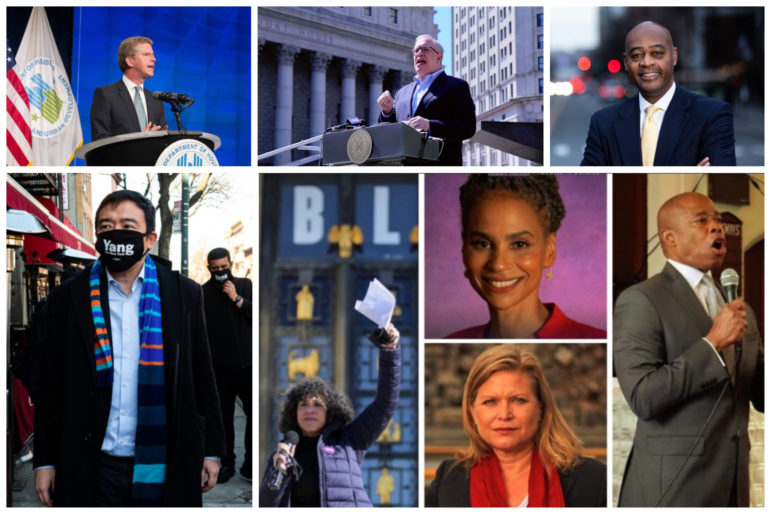Crime, yet again, led the conversation, with more than 50 mentions during the two-hour debate, according to a City Limits tally, followed by education, which was mentioned just shy of 40 times. Homelessness, a perennial topic, was raised more than 30 times.

Wikicommons/Sammyg1016; Office of the NYC Comptroller; HUD; Adi Talwar; Morales, Wiley, Garcia and Adams campaigns
The leading Democratic mayoral contenders.The leading Democratic candidates for mayor faced off in a second debate on Wednesday, the first chance the top eight has had to address a Zoom-weary electorate from the same stage, in person.
Crime, yet again, led the conversation, with more than 50 mentions during the two-hour debate, according to a City Limits tally, followed by education, which was mentioned just shy of 40 times. Homelessness, a perennial topic, was raised more than 30 times.
Ten days before the start of early voting, the evening became predictably contentious, with overlapping shouting from different candidates across the stage at WABC-7’s Manhattan studio.
Frontrunners Eric Adams and Andrew Yang also lobbed spicy barbs at one another during the cross-examination portion of the debate, when the candidates got to ask one another questions.
“You were late on responding to the gun violence in the city,” Adams said on Wednesday. “Your company discriminated against people of color. You left the city during a very difficult time—even during a time when I did not see my son over two months because I was in the street during COVID. You did not vote in municipal elections at all. I just don’t know—how the hell do we have you become our mayor, with this record like this?”
The question offered further insight into Adams’ strategy so far—stress that he “led” during the COVID-19 pandemic and Yang, his chief competition, “fled”—but it set Adams up for one of the more bruising smackdowns of the evening.

“Eric, we need to turn the page on the people who’ve been running our city into the ground for the last number of years,” Yang said, adding, “The problems have been getting worse around you while you’ve been running for mayor and raising money from your friends in real estate.”
He continued: “We all know that you’ve been investigated for corruption everywhere you’ve gone—city, state, even Barack Obama’s Department of Justice investigated you. You’ve achieved a rare trifecta of corruption investigations. Is that really what we want in the next mayor? You think you’re going to enter City Hall and it’s going to be different? We all know it’s going to be exactly the same.”
Unlike the online forums that have been a mainstay in the election so far, moderators were not armed with a mute button to curtail speakers who ran over their time, or, as happened frequently on Wednesday, who interrupted each other. The fray offered some opportunity for candidates, like Ray McGuire, to (smartly) demonstrate their mediation skills—he broke up the increasingly terse Yang-Adams battle of words, telling the two that the heated exchange didn’t serve voters.
Those who watched the first debate will note that there wasn’t a lot of new material by way of policy or proposals in the second. But viewers Wednesday did get to see Dianne Morales explain mounting problems battering her campaign: claims of workplace discrimination, a very public unionization push by her staff and the termination of four campaign staffers, who the new “Mayorales Union” said was instrumental to their organizing.
“I think what’s really important is to look at and measure the decades of successful experience that I’ve had,” she said. “Actually, the reality is that our team grew from 13 staff to 90 in the span of about six weeks. That kind of growth is explosive and unusual, but we responded, we addressed it, and we’re moving on.”
How’d They Do? City Limits Grades the Candidates’ Second Debate Performance
Stringer: A
Perhaps it was the change in format, but we certainly saw a more enlivened Scott Stringer on Wednesday. The comptroller—whose campaign was tossed off course by an allegation of sexual misconduct in April, which he has repeatedly denied—was armed with quick quips, smart attacks, and deft explanations of some of his key proposals.
McGuire: A-
Strong answers yet again. Plenty of detail, well-delivered.
Yang: B+
Overall, Yang made his plans around policing and the city’s economic recovery much more clear than in debate one. Fended off Adams’ attack quite well in the cross-examination, but weakly sidestepped claims that he doesn’t have enough government experience and that his Venture for America initiative discriminated against Black recruits.
Garcia: B
Still no standout moments from the former city sanitation commissioner. Her response to reports that Black and Latino workers in her Sanitation department were funneled into lower-paying jobs was unsatisfying. Her question for Stringer in the cross-examination, about his auditing the Parks Department 21 times and the NYPD only twice, was a very good one.
Adams: B-
As long as much of the debate conversation centers around crime, Adams will naturally speak with more authority. His strongest moment came in his question for Yang, though things quickly turned. His explanations of his proposals felt thin—more platitudes than policies.
Morales: B-
Handled the inevitable questions about her rocky campaign gamely, though breezily. In a debate that did focus a bit more on education than the first, more insight from this former public school teacher on how the city’s Department of Education can improve would have been appreciated.
Wiley: C+
What worked for Wiley in the Zoom debate—frequent interruptions of others and long-winded answers—seemed to backfire during Wednesday’s in-person event. Missed opportunity on the cross-examination question for Adams, too: Shaun Donovan asked him the same question in the last debate.
Donovan: C+
A stronger and more assertive performance this time, particularly around the subjects of homelessness, on which he is an expert, and around education. In an election where equity is emerging as a key issue, he could have talked up his equity plan, which he says has been acknowledged by President Biden, instead of the accomplishments he’s repeatedly touted.








